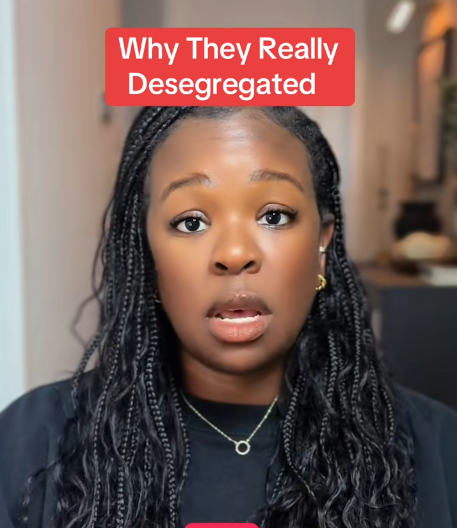A viral TikTok from creator @ashleytheebarroness is reigniting a charged and nuanced conversation about race relations, desegregation, and historical power structures in the United States.
In her nearly three-minute monologue, the content creator questions the motives behind America’s decision to end legal segregation, asserting that it was less an act of moral awakening and more a calculated geopolitical move.
“You really think they woke up and said, ‘Wow, Black people are human after all’? They didn’t desegregate because they loved us. They desegregated because they couldn’t afford to look stupid on the world stage,” she begins.

According to Ashley, the U.S. sought to polish its international image after World War II, particularly during the Cold War, when the Soviet Union was quick to call out the hypocrisy of American democracy. As the U.S. promoted freedom and equality abroad, its segregationist policies at home became a glaring contradiction.
“They couldn’t bomb their way out of that bad press,” Ashley argues, suggesting that the global optics of racial apartheid became a liability for America’s aspirations as a world leader.
Her perspective echoes that of some scholars who’ve long pointed to Cold War politics as a contributing factor in America’s civil rights shifts.
Historian Mary L. Dudziak, in her influential book Cold War Civil Rights, explored how international scrutiny forced American policymakers to reevaluate their domestic racial policies, not out of compassion, but necessity.
Ashley also challenges the popular narrative that Black Americans were desperate to integrate.
“We were thriving without them,” she explains, citing flourishing Black businesses, schools, and neighborhoods that were self-sustaining before integration.
She contends that desegregation dismantled those strongholds: Black schools were closed, teachers were fired, and Black-owned businesses lost support as Black dollars shifted to white establishments.
“Desegregation wasn’t a handshake. It was a hostile takeover,” she says.
Her critique deviates from the mainstream civil rights narrative, which often celebrates integration as a moral victory without addressing its economic and cultural costs to Black communities.
In fact, researchers have noted that following desegregation, many historically Black institutions—especially schools—were disproportionately affected.
A 2019 study from the Economic Policy Institute found that Black educators were significantly displaced in the aftermath of integration, contributing to a generational loss in wealth, community leadership, and educational continuity.
While Ashley’s tone is unapologetically pointed, her commentary invites broader questions: Can a society celebrate progress while ignoring the costs of that progress to marginalized communities? Who truly benefited from integration, and who lost the most?
In her closing remarks, Ashley reframes civil rights victories not as gifts from a benevolent system, but as the result of relentless, often painful struggle.
“We didn’t get rights because they loved us. We got them because we fought like hell while they smiled for the cameras,” she states.
Her post has received hundreds of thousands of views, with users flooding the comment section with a mix of praise, personal anecdotes, and calls for deeper historical education.
As debates over racial equity and historical revisionism continue across the U.S.—from school curricula to public monuments—voices like Ashley’s reflect a growing demand for narratives that center Black resilience, truth-telling, and the ongoing cost of structural injustice.
Desegregation remains one of the most celebrated milestones in U.S. history, but this new wave of online discourse reveals a deeper need to revisit the past with honesty, especially from those whose communities still feel the aftershocks.
